Daily Vocabulary Words: Enhance Your Lexicon with Leading Newspapers & Publications
Welcome to the Daily Vocabulary section at Wordpandit!
Our mission is straightforward: to bring you essential vocabulary words featured in top newspapers and publications worldwide. By focusing on words you’ll encounter in renowned sources, we aim to help you enhance your vocabulary effectively and practically.
Our selection includes words from:
– The New York Times
– The Washington Post
– Scientific American
– BBC
– The Guardian
– Psychology Today
– Wall Street Journal
– The Economist
– The Hindu
– The Times of India
– The Economic Times
– Hindustan Times
– Live Mint
– The Indian Express
– And many more.
We are committed to your vocabulary development. Simply visit this section regularly and explore the daily posts. This is your go-to repository for commonly used words, providing significant practical benefits by familiarizing you with vocabulary from the leading publications listed above.
Make it a habit to visit our website daily and expand your lexicon with words from top newspapers and publications.
WORD-1: KEENEST
CONTEXT: The Tories’ most demagogic streak will soon be on display in debates over the Rwanda safety bill, and not just because the MPs who are keenest to dispatch asylum claimants to Kigali also take mischievous pleasure in affronting liberal sensibilities over immigration.
SOURCE: The Guardian
EXPLANATORY PARAGRAPH: Imagine you are playing a game, and you are really, really good at it. You can spot the hidden treasure faster than anyone else. That means you have the “keenest” eyes. Being keen means you’re very good at something, especially noticing or understanding things quickly.
MEANING: The highest level of sharpness, intelligence, or enthusiasm in noticing or understanding things (adjective).
PRONUNCIATION: KEEN-ist
SYNONYMS: Sharpest, most eager, most perceptive, most enthusiastic, most alert, most astute, most discerning
USAGE EXAMPLES:
1. She had the keenest sense of smell and could detect the faintest scents.
2. Out of all the detectives, he had the keenest mind.
3. Her keenest desire was to win the competition.
4. With the keenest eyesight, the eagle spotted its prey from afar.
WORD-2: AFFRONTING
CONTEXT: The Tories’ most demagogic streak will soon be on display in debates over the Rwanda safety bill, and not just because the MPs who are keenest to dispatch asylum claimants to Kigali also take mischievous pleasure in affronting liberal sensibilities over immigration.
SOURCE: The Guardian
EXPLANATORY PARAGRAPH: Imagine if someone says something mean to you that makes you feel hurt or disrespected. That’s what “affronting” is. It’s when someone does something that feels really rude or insulting.
MEANING: Causing offense or making someone feel disrespected (adjective).
PRONUNCIATION: uh-FRUN-ting
SYNONYMS: Insulting, offensive, disrespectful, hurtful, demeaning, rude, provoking
USAGE EXAMPLES:
1. His affronting comments made everyone in the room uncomfortable.
2. She found his behavior affronting and decided to leave the party early.
3. The affronting remarks were unnecessary and unkind.
4. He was punished for affronting his teacher in class.
WORD-3: TYRANNY
CONTEXT: This is how tyranny makes itself electable: it is branded as the avenging arm of freedom.
SOURCE: The Guardian
EXPLANATORY PARAGRAPH: Imagine playing a game where one person takes all the toys and says, “I make all the rules, and no one else can play!” That’s like “tyranny.” It’s when one person or group has all the power and uses it in a way that isn’t fair to others.
MEANING: A situation where one person or group has complete control and uses it unfairly or cruelly (noun).
PRONUNCIATION: TIHR-uh-nee
SYNONYMS: Dictatorship, oppression, domination, despotism, autocracy, authoritarianism, absolutism
USAGE EXAMPLES:
1. The people revolted against the tyranny of the king.
2. Living under tyranny made daily life difficult for everyone.
3. The story is about a hero who fights against tyranny.
4. They sought freedom from tyranny and injustice.
WORD-4: INTIMIDATION
CONTEXT: Chutkan’s gag order tried to balance Trump’s First Amendment rights to assail the prosecution with the need to protect witnesses and court personnel from intimidation and potential violence.
SOURCE: Washington Post
EXPLANATORY PARAGRAPH: Imagine a big, loud dog barking at you and making you feel scared to walk by. That feeling of being scared or nervous because someone or something seems powerful or threatening is called “intimidation.”
MEANING: The act of making someone feel afraid or nervous, often by showing power or authority (noun).
PRONUNCIATION: in-TIM-ih-DAY-shun
SYNONYMS: Bullying, threatening, frightening, terrorizing, coercion, menacing, browbeating
USAGE EXAMPLES:
1. The bully used intimidation to get what he wanted from other kids.
2. She felt a sense of intimidation walking into the large, unfamiliar building.
3. The intimidation tactics didn’t work on him; he stood his ground.
4. They spoke out against the intimidation they faced at work.
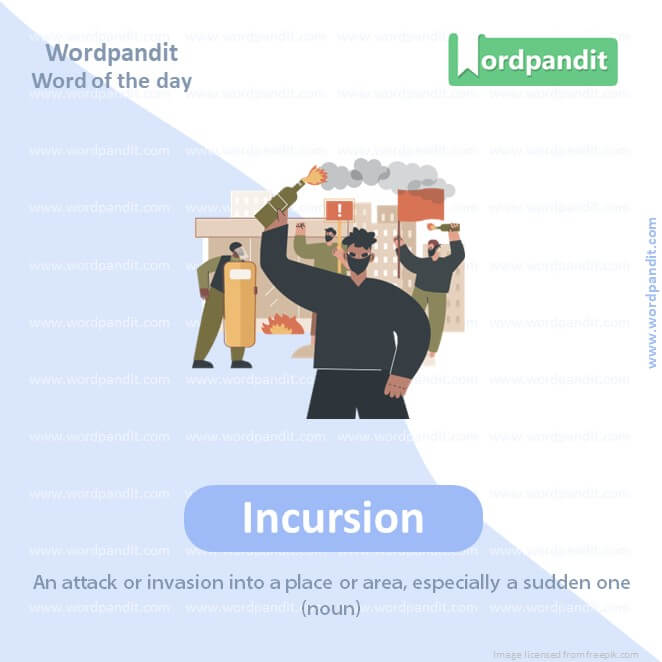
WORD-5: INCURSION
CONTEXT: The incident marks a significant escalation, as it represents Israel’s deepest incursion into Lebanese territory since 8 October and its most significant attack since July 2006.
SOURCE: Guardian
EXPLANATORY PARAGRAPH: Imagine you’re playing with your toys, and suddenly, someone else comes into your room without asking and starts playing with them too. That’s called an “incursion,” when someone enters a place where they’re not supposed to be.
MEANING: An attack or invasion into a place or area, especially a sudden one (noun)
PRONUNCIATION: in-KUR-zhun
SYNONYMS: Invasion, intrusion, raid, trespassing, encroachment, infringement, penetration
USAGE EXAMPLES:
1. The soldiers repelled an incursion on their territory.
2. The incursion of wild animals into the village caused panic.
3. The government worked to prevent further incursions by illegal trespassers.
4. The incursion of technology into everyday life has changed the way we communicate.
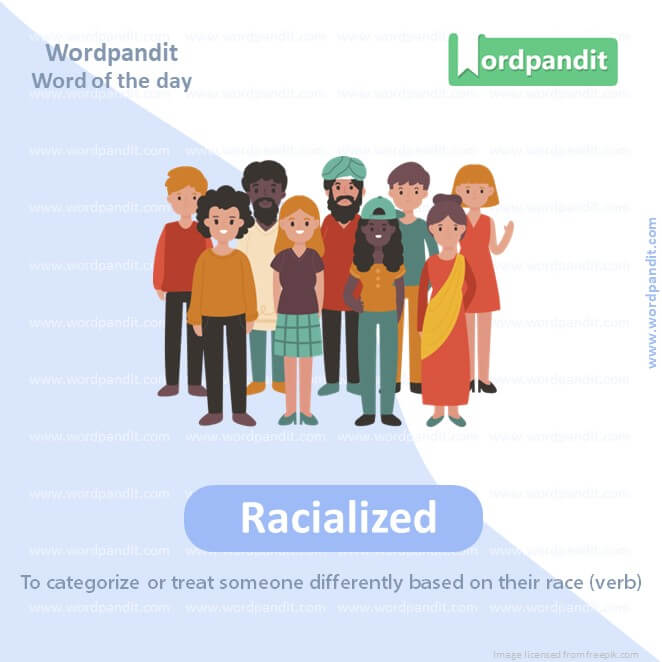
WORD-6: RACIALIZED
CONTEXT: D.E.I. is “bad” because it supplants merit for diversity and it empowers the racialized federal government to stick its hands into an institution that produces the cultural elite.
SOURCE: New York Times
EXPLANATORY PARAGRAPH: Imagine someone treating people differently because of the color of their skin. When we say something is “racialized,” it means that people start thinking about or treating others based on race, even when it shouldn’t matter.
MEANING: Made to be seen or understood in terms of race or racial differences (adjective).
PRONUNCIATION: RAY-shuh-lized
SYNONYMS: Categorized by race, segregated, discriminated, ethnically divided, racially identified, biased, prejudiced
USAGE EXAMPLES:
1. The debate became racialized, focusing on ethnic differences rather than the issue itself.
2. They experienced racialized comments at work, which made them uncomfortable.
3. The movie highlighted racialized stereotypes in society.
4. Racialized policies have led to inequality in many areas.
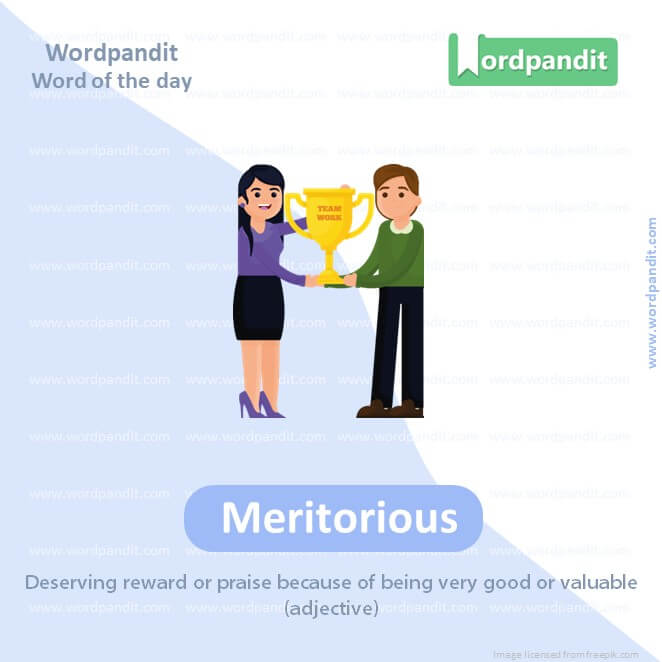
WORD-7: MERITORIOUS
CONTEXT: Whether higher education is less meritorious now than it was in some unspecified past cannot be measured.
SOURCE: New York Times
EXPLANATORY PARAGRAPH: Imagine you did something so good that everyone claps for you and gives you a special star sticker. When something is “meritorious,” it means it deserves praise or a reward because it’s really good or special.
MEANING: Deserving of praise, reward, or recognition because of being excellent or admirable (adjective).
PRONUNCIATION: meh-rih-TOR-ee-us
SYNONYMS: Commendable, praiseworthy, deserving, admirable, worthy, excellent, laudable
USAGE EXAMPLES:
1. Her meritorious performance earned her a special award.
2. He was honored for his meritorious service to the community.
3. The teacher praised the students for their meritorious efforts on the project.
4. The book was recognized as a meritorious contribution to literature.
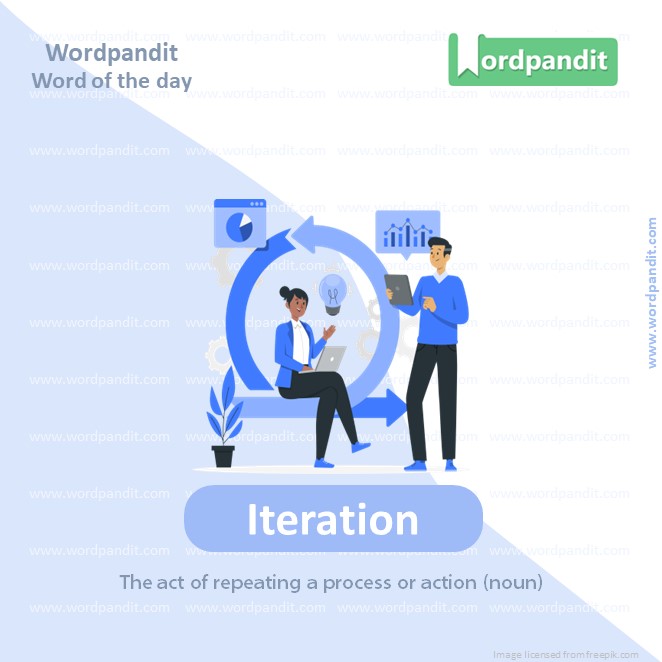
WORD-8: ITERATION
CONTEXT: Trump 2.0 will be more focused and more capable than the initial iteration.
SOURCE: New York Times
< STRONG>EXPLANATORY PARAGRAPH: Imagine you are drawing the same picture again and again, but each time you make it a little better. That’s called “iteration,” when you do something repeatedly, improving it each time.
MEANING: The act of repeating a process or action (noun)
PRONUNCIATION: it-er-AY-shun
SYNONYMS: Repetition, version, cycle, recurrence, repeat, revision, duplication
USAGE EXAMPLES:
1. The new iteration of the software fixed many bugs from the previous version.
2. Each iteration of the experiment brought them closer to the desired result.
3. The design went through several iterations before being finalized.
4. Iteration is key to perfecting any creative project.
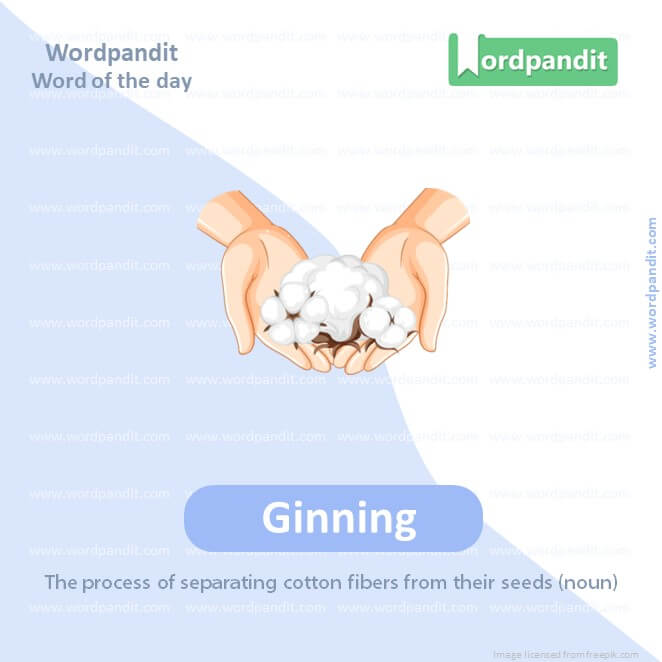
WORD-9: GINNING
CONTEXT: Ruffo explained his plan for ginning up controversy about higher education’s most prestigious universities in an interview on the heels of Dr. Gay’s resignation, explaining that it was a coordinated, strategic attack that used narrative, financial and political leverage.
SOURCE: New York Times
EXPLANATORY PARAGRAPH: Imagine a machine that helps take out the seeds from cotton, making it soft and clean. “Ginning” is what happens when that machine, called a cotton gin, does its job. It separates the cotton fibers from the seeds.
MEANING: The process of separating cotton fibers from their seeds (noun)
PRONUNCIATION: JIN-ing
SYNONYMS: Separating, processing, producing, manufacturing, extracting, cleaning, refining
USAGE EXAMPLES:
1. The factory specializes in ginning cotton for the textile industry.
2. The workers were busy ginning the cotton after the harvest.
3. Ginning is an essential step in preparing cotton for clothing production.
4. They were ginning out ideas for the new project at a rapid pace.
WORD-10: OSTENSIBLY
CONTEXT: A hearing ostensibly about antisemitism on campus quickly became little more than a coordinated political spectacle about power.
SOURCE: New York Times
EXPLANATORY PARAGRAPH: Imagine your friend says they’re going to the store to buy candy, but they’re really going to play at the park. When someone says they’re doing something for one reason, but they’re actually doing it for another, that’s “ostensibly.”
MEANING: Apparently or seemingly, but perhaps not actually true (adverb).
PRONUNCIATION: os-TEN-suh-blee
SYNONYMS: Seemingly, apparently, outwardly, supposedly, allegedly, on the surface, purportedly
USAGE EXAMPLES:
1. He went to the meeting ostensibly to discuss the project, but he had other motives.
2. She was ostensibly studying, but she was actually watching TV.
3. The changes were ostensibly for the better, but they didn’t improve much.
4. The trip was ostensibly for work, but they managed to fit in some sightseeing.
Vocabulary List English
In the vibrant marketplace of language learning, a ‘vocabulary list English’ is akin to a beautifully stocked grocery list – a tool that equips learners with basic ingredients necessary for fluent communication. However, absorbing the ‘vocabulary list English’ proficiently requires more than mere memorization; it calls for an informed and strategic method of learning.
The initial step towards mastering ‘vocabulary list English’ involves adopting an interactive approach. Instead of just reading and revising, use flashcards or digital memory tools to make the process more engaging. Such modes of learning not only retain interest but also boost retention and comprehension.
When learning ‘vocabulary list English’, practice is a fundamental element. Use these words in routine conversations, emails, or social media posts. The more frequently you use the words, the swiftly their usage becomes second nature.
A crucial part of understanding ‘vocabulary list English’ lies in knowing the context. Simply knowing a word’s meaning isn’t enough; you must know how it’s used in different situations. Reading a variety of materials, from fiction and newspapers to blogs and digital content, offers insight into the practical application of these words, deepening your understanding.
Furthermore, it’s vital to frequently revise ‘vocabulary list English’. Call back to what you’ve learned and give it another run-through. This habit strengthens memory retention and enhances the likelihood of the words being accessible when needed.
In conclusion, mastering ‘vocabulary list English’ is achieved through a blend of engaging tools, active practice, contextual understanding, and regular revision. These strategies, combined, can make the task of mastering ‘vocabulary list English’ a less overwhelming and more rewarding journey. As you venture into this process, you grow and expand your English vocabulary, achieving a heightened level of fluency and confidence in your English communication abilities.










